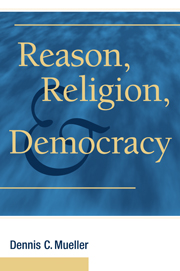Book contents
- Frontmatter
- Contents
- Preface
- 1 Liberal Democracy
- PART I FUNDAMENTALS: EVOLUTION, PSYCHOLOGY, REASONING, AND RELIGION
- PART II A HISTORICAL LOOK AT THE STATE, DEMOCRACY, AND RELIGION
- PART III THE INSTITUTIONS OF LIBERAL DEMOCRACY
- 10 Democracy and Citizenship
- 11 Rights
- 12 Education, Citizenship, Immigration, and Democracy
- PART IV CHALLENGES TO LIBERAL DEMOCRACY
- References
- Author Index
- Subject Index
10 - Democracy and Citizenship
Published online by Cambridge University Press: 05 June 2012
- Frontmatter
- Contents
- Preface
- 1 Liberal Democracy
- PART I FUNDAMENTALS: EVOLUTION, PSYCHOLOGY, REASONING, AND RELIGION
- PART II A HISTORICAL LOOK AT THE STATE, DEMOCRACY, AND RELIGION
- PART III THE INSTITUTIONS OF LIBERAL DEMOCRACY
- 10 Democracy and Citizenship
- 11 Rights
- 12 Education, Citizenship, Immigration, and Democracy
- PART IV CHALLENGES TO LIBERAL DEMOCRACY
- References
- Author Index
- Subject Index
Summary
During the contest of opinion through which we have passed, the animation of discussions and of exertions has sometimes worn an aspect which might impose on strangers unused to think freely and to speak and to write what they think; but this being now decided by the voice of the nation, announced according to the rules of the constitution, all will, of course, arrange themselves under the will of the law, and unite in common efforts for the common good. All, too, will bear in mind this sacred principle, that though the will of the majority is in all cases to prevail, that will, to be rightful, must be reasonable; that the minority possess their equal rights, which equal laws must protect, and to violate which would be oppression.
(Thomas Jefferson, Inauguration Address)Starting with the United States' successful introduction of democracy at the end of the eighteenth century, democracy has spread throughout what is generally referred to as the West, and now can be found in one form or another on all continents save Antarctica. Today democracy is widely believed to be the best form of government, with even petty tyrants holding sham elections to justify their office. Their examples show, however, that democracy's triumph has been incomplete. Even where tried, it has not always lasted or been seen as a success. The success of democracy depends on both what (whom) citizens vote for and how these votes are aggregated.
- Type
- Chapter
- Information
- Reason, Religion, and Democracy , pp. 239 - 270Publisher: Cambridge University PressPrint publication year: 2009



